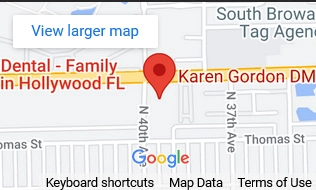Non-Surgical Treatment for Periodontal Disease
Periodontal (gum) disease is not typically our greatest fear, but if you let it take over your mouth, it can cause very serious issues. Periodontal disease is the main cause for almost 70% of adult tooth loss. The infection can start off small in a tooth without any pain, but if left untreated it can eventually grow into a full-blown disease and affect all your teeth.
How do You Get Periodontal Disease?
We all have bacteria in our mouths so it’s completely normal for our teeth to have good and bad bacteria. The bad bacteria comes from the food we eat and saliva that get stuck along the gumline. This buildup is known as plaque.
When the plaque thickens and hardens it becomes tartar, causing infection in the gums. The bacteria in the tartar eat the gums slowly, progressing deeper until they reach the bone which supports the tooth. Once the bacteria have completely destroyed the surrounding gums and the bone around the bottom of the tooth, there’s no other solution but to extract the tooth.
However, even after tooth extraction the gums still need to be treated because the bacteria still remains within the mouth. Plaque also needs to be removed from the remaining teeth. What you need is a corrective procedure to prevent the tartar from completely eating into the teeth.
Assessment and Diagnosis
To assess whether or not you have gum disease, a visit to the clinic is required. Our dental team will evaluate your teeth and determine if the tartar is already eating away your gums. A formal diagnosis can be made by measuring the depth of the pockets which the tartar has already eaten into your gums. Pockets that are deeper than 3 millimeters are high-risk and need immediate treatment.
For pockets that are less than 3 millimeters in depth, treatment is still required to prevent worsening of the infection. There is also preventive care provided for tartar buildup which hasn’t caused pockets in the gums yet.
Treatment for Periodontal Disease
Depending on the severity of the infection, there are different approaches to treating periodontal disease.
1. Mild cases
For mild cases where there is plaque but it has not yet hardened or caused an infection in the gums, regular dental cleaning is advisable. Cleaning should be done at a minimum semi-annually to ensure that the plaque does not form into tartar and the teeth and gums remain healthy.
2. Moderate cases
For moderate cases where tartar has already caused an infection but the pockets are not yet 3 millimeters deep, dental cleaning is required twice a year. This will help prevent the further buildup of tartar by removing all of the bacteria on the teeth and inside the lining of the gums. This will also maintain the cleanliness of the mouth and improve overall dental health.
3. Severe cases
For severe cases where tartar has already eaten into the root of the tooth, the treatment requires a procedure called scaling and root planing. This process is an in-clinic deep cleaning procedure that does not require surgery. It is done under a local anesthetic and involves thorough cleaning above and below the gum line (scaling) to remove the plaque and tartar. Afterwards, the root of the tooth is smoothed out (root planing) to remove the rough parts that were eaten by bacteria. This is done to clean the tooth and create a smooth new surface for the gums to attach to.
4. After-treatment care
Our clinic offers periodontal maintenance for all patients who have been diagnosed with periodontal disease. We provide a care plan to prevent the recurrence of the disease and ensure that all plaque buildups are cleaned on a regular basis. We also provide a dental health guide which patients can follow to take care of their teeth and gums at home.
Prevention of Periodontal Disease
Even if you don’t have periodontal disease, this doesn’t mean you can overlook it. Twice-a-year dental cleaning is advisable for everyone, young or old, high risk or low. Apart from clinical assistance, proper dental hygiene is also a huge factor in your overall oral health. You can prevent periodontal disease at home by brushing regularly and flossing. Using the right toothpaste and protecting your teeth from damage are also ways to prevent oral diseases.
Dr. Karen Gordon and our dental team are all highly skilled and trained to perform treatment for periodontal disease, as well as scaling and root planing. These procedures are very intricate and require expertise. We are proud to offer our services due to our many years of experience and training. Our team are also very warm, caring and provides the best assistance to all of our patients.
Call us at (954) 613-9837 and schedule an appointment for your periodontal diagnosis.




